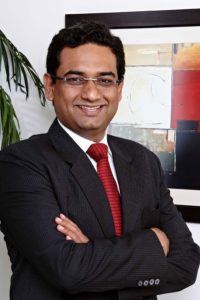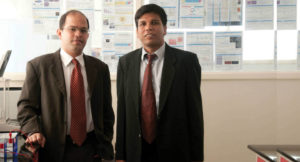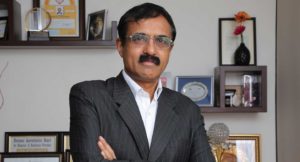Pune-based Indus Health Plus aims to spread preventive healthcare to more than 350 cities in the country by personalising its packages and increasing corporate reach

A chartered accountant by training, Amol Naikawadi, lacked a formal exposure to the healthcare industry. However, the needs of his close friends and family made him understand the importance of preventive healthcare in the country. “We still do not apply the concept of early detection to our health. When I was talking to my friends, I got to know about many instances of late detection and the implications of the same,” recalls Naikawadi. And hence, he, along with like-minded colleagues, set up Indus Health Plus (Indus) in the year 2000 with a clear focus on early detection and prevention.
The team took help from doctors in executing tests and created comprehensive packages. “No one wants to go to a hospital. So we decided to better people’s experiences keeping in mind their time constraint and made sure that the processes are carried out in a single day,” he says. The company made a conscious decision to focus on people whose requirement was a routine check-up and the founder convinced a group of doctors to support the company. Right from the beginning, Indus focussed on joint ventures to handle the tests. “Indirect alliance partners have helped us reach Tier-II and Tier-III towns, villages pan India to cater to the needs of our customers,” ads Naikawadi. It has tie-ups with state-of-the-art hospitals and diagnostic centres across the country and has comprehensively designed check-up packages.
At present, the company has reached out to more than 80 lakh people. It has delivery partners in 78 cities across 122 centres in 17 states. Indus has a network of 150 consultant doctors working with it while employing its own doctors too. “Technology has advanced considerably in the last 15 years and positively impacted healthcare, especially, in early detection and treatment. We have introduced comprehensive packages relevant to various age groups based on this technological advancement,” says Naikawadi.
Joining forces
“When we started, we convinced a group of doctors and had an arrangement with the diagnostic centre,” recalls Naikawadi. Over a period of time, the model has evolved in such a way that Indus shares the infrastructure with its delivery partners. And that’s the reason it has been able to setup multiple centres that are owned by the delivery partners where it conducts the tests. For example, the company has partnered with Apollo, Wockhardt diagnostic chains and standalone hospitals where its team sits in these locations and uses their facilities for the tests, instead of investing in equipment to set up its own lab. “Everything is handled by us, right from awareness, creating packages and so on. The check-ups at the centre, which is owned by someone else, is conducted jointly,” explains Naikawadi. Through this joint approach, the company has kept its costs low and passes on this benefit to its customers.
A larger portion of Indus’ volumes come from the metros though it has a strong presence in the Tier-II and Tier-III regions across the country.
Making people aware and creating that urgency in them to prioritise their health is a big challenge
Setting the standard
In the healthcare industry, prices across various centres change and one of the biggest advantages Indus offers is a standard service experience at a standard price, across all its centres. “The younger generation find this beneficial as they move to different cities on work, despite which, they can keep our package for themselves and their family members,” says Naikawadi.
While working out pricing, Naikawadi’s background in finance came in handy. “ While we use the delivery partner’s infrastructure, we also bring them additional earnings. Typically, doctors and hospitals see patients only when they are sick. Through us, they contribute in a healthier, more positive way.”
Indus also offers a unique experience of preventive health check-up. “We are clear that we are not catering to patients. These are healthy individuals who do not require immediate medical attention. We do not offer our services to patients,” he clarifies.
Taking strides forward
One needs to remember that preventive healthcare is not a one-time activity. “We are seeing good traction as a large number of people are becoming regular with it,” says the Indus founder.
“A good amount of our business for the last two years came from our existing customers,” says Naikawadi. The company gets a lot of references that lead to customer conversion. Over a period of time, it has focused on customer experience and invested heavily in building a relationship with its customers. In this entire model, Indus is the single point of contact, right from creating awareness, guiding, helping identify the right package to the final experience at the centre. “After the check-ups, we conduct engagement activities with our consumers like contact programmes, conduct sessions with doctors in different geographies to talk to our customers on various relevant topics,” says Naikawadi.
In all of this the biggest challenge continues to be awareness. “Making people aware and creating that urgency in them to prioritise their health is a big challenge,” says Naikawadi.
To better awareness, Indus conducts group activities, where knowledge and education about preventive healthcare is spread across small towns to housing societies, corporates and small groups of people alike. “We have a call centre where more than 200 people engage with prospective customers,” he adds. The company also has partnerships with credit card and finance companies and so on.

Growing with times
The founder admits that last year the company was not able to sustain its double digit growth due demonitisation as preventive healthcare is a discretionary spend. On all other fronts, the company has grown. “Earlier, those in the 50s age group used to come for check-ups, now, a good percentage of people in this age group are doing check-ups,” says Naikawadi.
Thanks to the advancements in technology, healthcare is growing as a category in the Tier-II and Tier-III markets. “Earlier, people had to travel a longer distance for quality healthcare as it was in select pockets. Now we are able to take affordable, quality care straight to them,” says he.
In the next few years, Indus is working towards using its scalable model in such a way that it can reach almost 350 cities. “The idea is to replicate this model and take it to every district across the country,” says Naikawadi. It has expanded its market reach by entering new cities and taking its packages to corporates and helping them create preventive solutions for their employees. To help increase adoption, Indus has introduced financing options as well. The company is also in the process of partnering with insurance companies. “We will be working with them to help them keep their policy holders and their clients healthy,” shares Naikawadi.
This apart, the company plans to launch packages for all family members, including adolescents and domestic help as well.
To understand different people and their lives, Indus is going to the next level of personalised preventive healthcare. “We are personalising preventive healthcare based on each person’s family history and other factors to help them create a relevant annual package. Our entire offering is evolving to a personalised solution that is continuously updated,” says Naikawadi.
“On one side there will be centres and on the other side, there will be an evolution of services for different family members, personalised on the basis of past data. In addition, our method of reaching out will change and will fine tune solutions in such a way that it remains affordable,” concludes a positive Naikawadi.
What Next?
- Enter 350 cities
- Launching packages for families
- Forge alliances with insurance companies
- Forge alliances with corporates
- Personalisation of solutions based on data available





